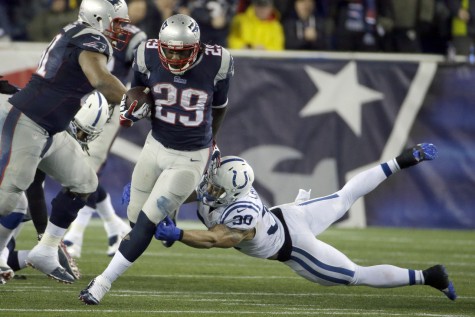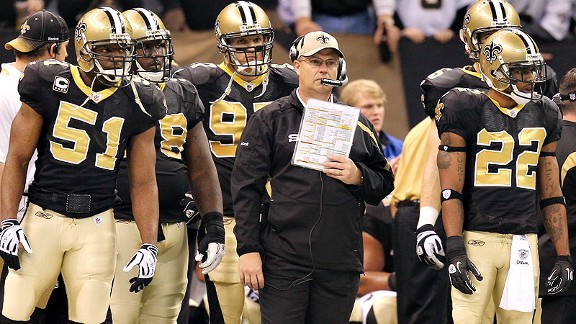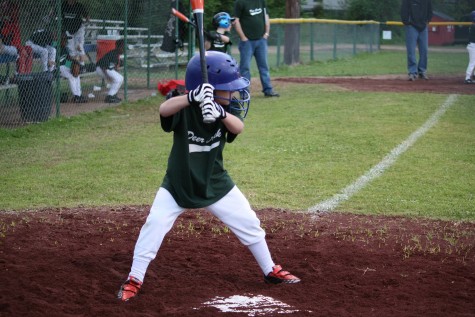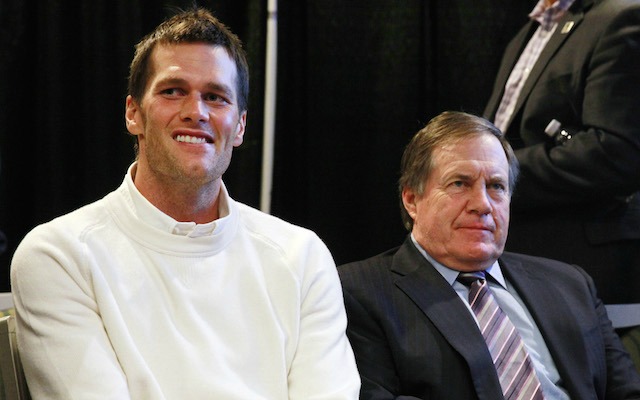Cheating the win
May 24, 2015
What do athletes sacrifice to hit those goals? Training at a gym for several hours each day for four years leading up to the Olympics – Easy? No. Legal? Yes. Taking a performance-enhancing drug – Easy? Yes. Legal? Not so much. Where does the sports arena draw the line between competing at a high level and winning at all costs?

A player from the Patriots runs with the ball, attempting to avoid the defensive player from the Colts. The 2015 AFC Championship between the two teams resulted in the Deflategate controversy.
Equipment-related cheating in professional sports
Creative Commons
New England Patriots quarterback Tom Brady and New England Patriots head coach Bill Belichick during the Super Bowl XLIX-Winning Head Coach and MVP Press Conference. The two fended many questions regarding Deflategate.
During the 2015 American Football Conference (AFC) Championship game on Jan. 18, 2015, eleven of the twelve New England Patriot footballs were inflated below the minimum of 12.5 PSI, enabling easier grip for both quarterback Tom Brady and wide receivers. Opponents Indianapolis Colts competed with footballs inflated to standard pressure, and the Patriots, who went on to win the Super Bowl, were accused of having an unfair advantage. After conducting intensive investigations, the National Football League (NFL) has suspended Tom Brady for four games without pay, fined the New England Patriots $1 million and revoked two of the team’s draft picks in 2016 and 2017.
This scandal, known as “Deflategate,” sparked nationwide controversy. Mountain View Volleyball Club’s 13-Red team’s head coach, Colleen Carey, says that the New England Patriots should be held responsible for the scandal.
“There’s a lot of things about Tom Brady wanting to keep the balls on the lower end [of the news] and so maybe [“Deflategate”] was actually feasible,” she said. “Maybe it wasn’t Tom Brady that knew, but somebody had to know — it was such a big discrepancy [in pressure].”
However, many believe that “Deflategate” has received excessive media coverage.
“In the football world, it’s about the equivalent of wearing seven-eighths inch cleats when you’re supposed to wear three-quarter inch cleats,” Upper School Strength and Conditioning Coordinator Ron Forbes said. Before coming to Harker, Forbes was the coordinator of strength and conditioning at the University of Florida and the director of sports performance at Stanford for seven years.
“I just think that was something to stir up controversy. Basketball players may not be so sensitive that they can pick up a ball and [say], ‘There’s exactly 13 pounds of pressure in here.’ But, as soon as they start to dribble it, they know it’s either under-inflated or over-inflated. Well, it’s kind of the same with a quarterback with a football. You pick it up and throw it, [and] you know it’s under-inflated or over-inflated. Under-inflating a football allows the quarterback to grip it better and throw it better, and that happens every week at the collegiate level and the NFL level.”
What provokes a team as successful as the 4-time Super Bowl Champion Patriots, who were accused of videotaping the New York Jets’ play calls during a 2007 game, to rely on illicit tactics to win? Forbes believes that one of the reasons lies in the financial pressure that professional organizations place on their athletes.
According to a 2014 report from Business Insider, the average annual salaries of professional athletes in the National Basketball Association (NBA), Major League Baseball (MLB), National Hockey League (NHL) and National Football League (NFL) are $4.5, $3.9, $2.4 and $2.0 million, respectively.
“At that level, I think you’re asking a question that has more to do with financial success and wealth than about winning. LeBron James was 18 when he graduated from high school,” said Forbes. “I would like to know how many 18-year-olds would act responsibly if you put $50 million in cash in [their] hands and then watched them for the next two or three years. The athletic population is faced with tremendous opportunity to make poor decisions at a very young age.”
Professional athletes have an influence on the actions of aspiring athletes. Those who look up to the players and coaches hope to one day stand in their shoes.
University of San Diego Sports Psychology Consultant Paul Ashbrook reflected on the resonating effect that well-known athletes have upon children.
“Professional athletes often times don’t want to acknowledge they are role models. The thing is, whether they want to be role models or not, they are,” he said in a phone interview. “When most kids are growing up, they say ‘I wanna be like Michael Jordan, or Tom Brady,’ or whomever, so you’re naturally going to be drawn to these people, whether the athletes agree with it or not.”
Violence and drug related cheating

Creative Commons
The New Orleans Saints coach deliberates a play call during a game. The Saints were found guilty of the bounty scandal in 2009.
The 2011 “Bounty scandal” of the New Orleans Saints is a notable incident where Saints coaches gave defensive players pay bonuses, known as “bounties,” in exchange for exacting injuries upon opponents during games. According to the NFL, players from the Saints would receive $1000 for a cart-off, a hit that resulted in a player having to leave the field.
“I think what it tended to be more of was ‘Hey if you take this guy out, whether it’s for the game or a week, we’ll give you a bonus,’ ” Ashbrook said. “In the eye of an athlete, they’re not looking at it from the perspective of ‘I want to hurt this guy because I don’t like him or that person.’ It’s ‘I’m going to hurt him because I’m going to give myself and my team a better chance to win.’ ”
In addition, 2009 Saints defensive captain Jonathan Vilma was willing to offer $10 million to any player who knocked out Brett Favre, the Minnesota Vikings quarterback, during the 2010 National Football Conference (NFC) Championship game. Although the Saints did not succeed in reaching this goal, the NFL suspended Vilma for the entire 2012 season.
Player safety is already a cause of major concern, especially in the highly physical sport of football. Even with the NFL’s attempts to suppress scandals, it remains difficult to rid the sport of cheating.
“If you’re talking about cheating scandals, that comes down to the character of the program and the character of the team and the character of the players,” Varsity football player Sidhart Krishnamurthi (‘15) said. “That does not come down to the fact that there’s so much pressure to succeed. [Performance-enhancing drugs], recovery drugs, those things that are in the NFL today, I feel like those things are hard to avoid because you’re counted on to make that money.”
Besides violence, some professional athletes resort to the use of drugs. Convicted in 2013, American cyclist Lance Armstrong was stripped of seven Tour de France titles due to his use of steroids and performance-enhancing drugs.
“I understand why he would use drugs, but I don’t think it is the ethical choice,” former Varsity tennis player Alex Mo (‘17) said. “I think that it is unsportsmanlike to do that to other competitors.”
The prevalence of cheating incidents in sports has led to discussion over why professional athletes go to such lengths to perform.
“I think once you worked really hard, after a certain point, it’s harder to get stronger and harder to get faster,” Harker Varsity football player Trenton Thomas (‘16) said. “So you look for an alternative.”
Varsity swimmer Aaron Huang (‘15) believes that cheating can result from an athlete’s’ personal perception of competition.
“I believe that once sports lose their sense of fun and excitement and become simply a task or job, competition becomes burden and not a stimulus, as it should be,” he said in an email interview.
Children-related cheating

Cheating scandals aren’t purely constrained to purely professional sports. Jackie Robinson West, the 2014 U.S. Little League World Series champions, had its championship title stripped as a result of their use of ineligible players on their roster. By recruiting players from outside stipulated geographical boundaries, the baseball team added more star players to their roster, lending them an unfair advantage over other teams in the league.
Ashbrook shared his insights into why young athletes and coaches may choose to break the rules.
“Realistically, there’s probably a couple main issues,” he said. “They typically stem from how you’re raised, the norms that are set forth by coaches, peers, and others. You’re a kid and you’re raised in a family where cheating is acceptable, obviously that’s going to be more common, more likely. Those around you, whether it is coaches, peers or parents, emphasize [cheating] in some way or allowed it in some way.”
As competition increases, coaches and players alike attempt to find more ways to maneuver around the rules of ethical conduct. According to the 2005 National Youth Behavior Survey, about 60 percent of high schoolers using performance-enhancing drugs (PEDs) said that professional athletes influenced their — or a friend’s — decision to use PEDs.
“At the high school level you might be really good at your sport and when you go to the collegiate level you, the pressure is heightened,” Varsity volleyball player and Yale Volleyball recruit Shreya Dixit (‘15) said in a phone interview. “People who were once great in high school might not be able to feel heightened senses of appreciation in college. In some sports [taking PEDs] is so common at this time that they feel like it’s necessary to take them in order to compete.”
Along with the suspension of the coach, Jackie Robinson West lost its championship title and coaches across the country condemned its actions.
“Shame on the coaches. Shame on the organization,” Forbes said. “It’s one thing to exercise poor judgement through inexperience and immaturity. It’s another thing for an organization and a bunch of grown men to do it. If there’s a segment of our society that needs help, that’s the segment.”
Craig Johnson, Head Coach of the 12U Sunnyvale Girls’ Softball team, echoes that sentiment, reflecting on the impact of this cheating scandal on young children involved in sports.
“That’s when you’re taking sports to a level that it shouldn’t be at, where sportsmanship is not the focus; it’s only winning,” Johnson said. “[Children] should learn that there’s consequences for your action that even though you think you may get away with something, eventually it comes out and there will be logical consequences.”
This article was originally published in the pages of Wingspan, Issue 2, Vol. 1 on May 23, 2015.

